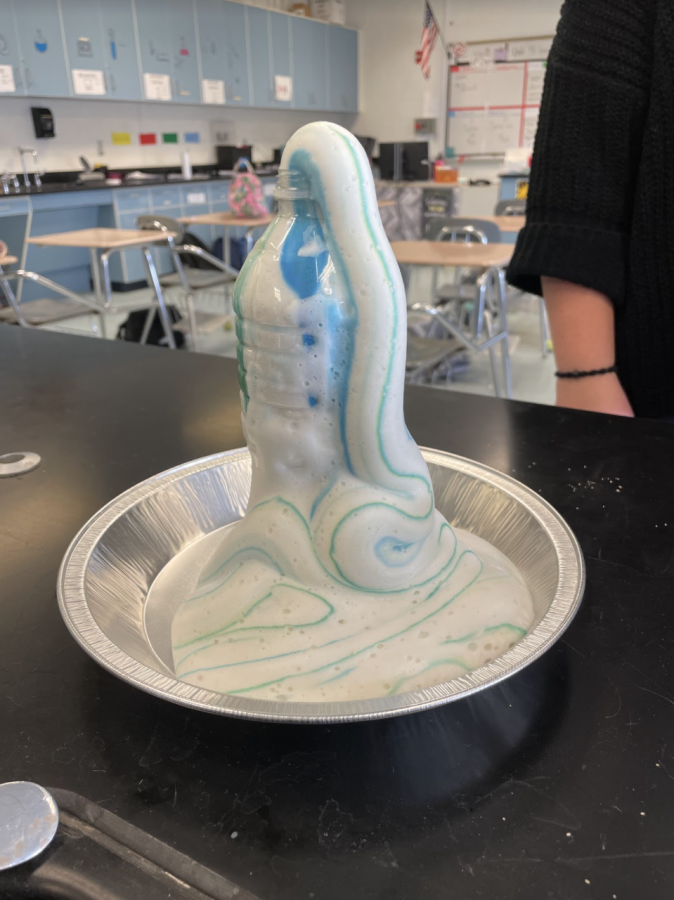Experimenting With Course Selection? Read About Ludlowe’s Science Classes
From electives to AP science courses, Ludlowe provides many choices when it comes to course selection. Below are the thoughts and reviews of current students taking classes relating to physics, chemistry, earth science, biology, and computer science.
Physics Courses
Physics
“The course provides a relevant and accessible foundation in physics, which will bolster your scientific literacy even if you don’t plan to explore the physics field further. The first semester provides an overview of mechanical physics while the second semester delves into electricity, magnetism, and the theory of relativity. It is critical to keep an open mind and be willing to part with some of your prior knowledge and misconceptions. It is also key to differentiate between related concepts like velocity and acceleration, and to be able to describe and justify your calculations, not just plug numbers into a formula. I think taking the course alongside calculus is beneficial, as you will be able to draw connections between physics phenomena and calculus concepts, but you could definitely enter the course with just a precalculus background.
Aside from studying for tests, the course does not have a heavy at-home workload; you will typically complete worksheets and activities in class. Labs such as creating paper ‘crash barrels’ to minimize the impact of a car crash will increase your understanding of key concepts like velocity, momentum, and conservation of energy. Be willing to change your study strategies and ask questions of your teacher and peers in order to really understand each lesson. Once the concepts click, you’ll never see reality–or, your frame of reference–in the same way” – Harper Treschuk
Science of the Cosmos
“Science of the cosmos is a great class if you’re looking to learn more about astronomy. While there are a few challenging concepts, the workload is very manageable and the content is super interesting and relevant.” – Kelsey Farber
AP Physics I
“I think physics is a really important class to take whether or not you know what you want to study in college. AP Physics 1 gives us a general understanding of how the world works, and it’s also a really interesting class. However, it can be very confusing sometimes because it is very conceptually based unlike other AP Sciences, such as Chem for example… If you plan on taking it, you have to be prepared to put the time in to understand it. Since it’s an AP Class, the curriculum is nationally standardized so finding resources to help you is extremely easy. Aside from the numerous packets we get in class for extra practice, there are a plethora of youtube channels to help understand concepts, and I would strongly recommend purchasing the Princeton Review book as well. Physics is a very rewarding class and understanding what’s happening can be very satisfying, so I would 100% recommend taking it if you’re considering it.” – Abhir Naik
AP Physics II
“I took AP physics 1 as a junior with my aim being to take AP physics II senior year, as I felt that after taking the course it totally fit my learning style and way of thinking about problems. We started out the year with electricity and circuits, which naturally tied in with our next unit of magnesium. We were able to test out labs with hands-on activities and actually see the problems we were figuring out. The blend between the math that we were doing and proving in with these labs was very much satisfying and fun. Further, for our midterm we had to design some sort of contraption that performed a task. With this very open ended question we settled on making a generator with spinning coils and magnets. This was a super cool exercise and truly allowed me to even better understand the concepts that we were learning. I would definitely recommend this class for any hands-on learners who enjoy the math aspect of science. Time management skills are essential to the workload of this class. Taking the time to go in after school for extra help is definitely what I would recommend for anyone who is looking to succeed and get the most out of this class.” – Emile Racquet
AP Physics C
“If you like calculus and want to go to the next level after physics I, I would definitely recommend AP Physics C. It is my favorite class during senior year of high school, so I’m glad that I have the extra half class. Additionally, the entire class is composed of students who love physics, so everybody is always engaged. The first half of the year, while learning magnetism, you get to do fun experiments like using magnets to bend plasma and creating electrical circuits. During the second half of the year, you do more work on mechanics and energy which I also enjoy.
The only downside to the class is that it can be challenging fitting all the learning material within class time since there are 2 AP tests, so a lot of work has to be done at home using AP Classroom. However, the class has been very collaborative and friendly, so you don’t feel like you’re on your own in the process… If you don’t like using calculus, then AP Physics II is a great option since there is only one AP test and the entirety of the material is algebra-based.” – Ethan Carty
Chemistry Courses
Nutritional Chemistry
“I am so happy I took nutritional chemistry. I think it’s a perfect class for people of all chemistry and science backgrounds. We learned about macromolecules, minerals and vitamins. Something I liked about the class was that it had a good mix of notes, labs, and group work. One of my favorite labs we did was when we extracted iron out of cereal with a magnet. I’m happy I took this class and would recommend it to anyone interested in chemistry.” – Megan Sullivan
AP Chemistry
“AP Chemistry is a great class. Although the course itself and the content can be hard, it is an extremely rewarding class and helps prepare you for future courses. The course itself is fast paced, and we have a quiz at least once a week and a test about every 2 to 3 weeks depending on the unit length. A typical amount of homework per night is about 30-45 minutes, but before a test I normally spend 1 to 2 hours a night preparing for the test for a couple days. This may seem overwhelming; however, if you do your homework, stay on top of your work from class, and advocate for yourself when you are confused (this is really important) you will be more than prepared for each test. Lastly, although this work is a lot, the class itself is really fun. We don’t only do notes in class; we do practice problems in groups which allows you to meet new people, and we have done some really cool labs in class. Overall, I would definitely recommend this class to people who have good time management skills and who like science and math.” – Elizabeth King
Earth Science Courses
Earth’s Dynamic Environment
“Earth’s Dynamic Environment provides you with an appreciation of earth systems and large-scale processes. We begin by investigating how earth has changed across geological history, through periods of rapid evolution and extinction, and then apply that knowledge to understand human impact on the earth today. The workload is very manageable. It’s totally possible to take the class alongside another science, or pair it with a second science elective. The class has few labs and focuses more on concept modeling and simulations, given that we are exploring the world at a macro level. At the beginning of the class, we created miniature terrariums to model how earth is a closed system. Even though it is just a semester, it is a well-rounded introduction to earth science. You’ll be able to connect what you learn to other disciplines and become a more knowledgeable consumer of climate news today.” – Harper Treschuk
The Planet’s Oceans
“I actually really loved [The Planet’s Oceans] class. I think it’s a good choice if you’re interested in environmental issues. We learned a lot about the effects of human behavior on the oceans. It’s a very hands-on class so I would recommend it if you want a science elective that has more labs. For one of our projects we had to design our own water filtration system, which was really fun. Even though STEM classes aren’t my strong suit, the workload was very manageable for me, it’s definitely not as intensive as a full-year science.” – Emma Gildersleeve
AP Environmental Science
“APES is truly an interdisciplinary course. It has a combination of biology, chemistry, and even economics elements, which makes the course unique. Personally, my favorite aspect of the class is how relevant everything is. You’re going to be learning about stuff that you’ll encounter every single day. Unlike biology and chemistry in which you simply learn content, APES takes the content and relates it to the world that we live in. My recommendation for APES is, like other APs, do your textbook readings! The workload isn’t bad compared to other APs especially because you’ll truly find the content enjoyable to learn. Absolutely would recommend this course!” – Allen Yao
Biology Courses
Human Anatomy & Physiology: Brains, Bones, and Brawn and Human Anatomy & Physiology: Blood, Buts, Senses, and Defenses
“Personally, I loved all of the science electives I’ve taken but both anatomy classes have been one of my favorites. You don’t have to take both the same year. I took Brains, Bones, and Brawn junior year and Blood, Guts, Senses, and Defenses senior year because I liked the class so much. Both are super fun and interesting, students get to do hands-on activities and labs to learn about the human body which really puts what you’re learning into perspective. It’s not a difficult class as long as you pay attention and keep up with the work, which isn’t a lot either. Most work you can do in class and have plenty of time to do it. Other than that it’s a relaxed, easy class, and I definitely recommend it!” – Laila Arslanagic
Marine Biology Science
“I really loved [Marine Biology]. I took it first semester sophomore year, so this was all before COVID… We went on lots of field trips to the beach and different places like rivers. It was so much fun to go in them with the waders on and catch fish to do an experiment or something like that. The workload in that class was very light, which was nice. We probably had 5 tests in total, and the final was just a project, which was pretty easy. I also loved that we had tanks of fish, so it was easy to make friends with people in your tank group. Mrs Jenkins is the teacher, and she’s the best so that’s also a big plus to the class.” – Isabella Factora
AP Biology
“I chose to take AP biology because I’m generally really interested in the topics that are covered. I am most looking forward to learning more about genetics and heredity. I also think the labs we do are more interesting than say freshman year biology. The experiments are more in-depth and we have the ability to manipulate the variables to see how it affects the results.
It is a very independent course, like any AP class, so my advice is to stay on top of note-taking. It is expected that you take notes on your own (at home) and apply it during class.
I would recommend taking AP biology for anyone who really enjoys biology. The content covered is much more in-depth compared to freshman year biology. As with any AP course, the material being learned is college-level and fast paced. The workload is very manageable. The only assignments that I take home to do are usually just textbook notes, some review worksheets from what we did during class, and pogils.
Since it is an AP class, you are expected to do a lot of independent work outside of class. But, like any other class, if you find yourself struggling, your teacher is always willing to help you out. Even if it’s a small part of a concept that you don’t understand, seek out your teacher because it’ll help you feel more confident and you’ll be able to work through concepts a lot easier.” – Kristina Yuan
Computer Science
Computer Engineering
I take Computer Engineering III, and there are 5 levels of computer engineering classes. In my class we do a combination of software and hardware activities. We use Arduinos, we solder, and code in Python. The best part of the class is how many activities are self-paced and self-guided, so one person could be programming their Arduino and I could be practicing coding on Python. The workload is very manageable, and we do almost all of our work in class since we don’t have access to our Arduinos or computers to take apart at home. If you have taken computer engineering I or II, I definitely recommend taking this course, since it builds off of the skills from the prior courses.” – Abby Upton
AP Computer Science Principles
“The class is a great AP class to start out with for people who might be hesitant to dive into a huge workload, and it’s great because it enables underclassmen to take it and get a feel for what an AP workload feels like as they become an upperclassmen. The class teaches a bunch of useful fundamentals which are going to come in handy no matter the future career path.” – Siya Bajaj
AP Computer Science A
“I have found APCSA to be very accessible, particularly as an underclassmen. Unlike some of the other AP sciences, APCSA has no prerequisites. While I did take a computer programming elective freshman year, I think taking APCSA with no prior programming experience is very doable. What I like most about it is that there is a lot more freedom than some other science classes. When creating a program, there might be multiple different ways of achieving your desired goal. A piece of advice regarding the class would be to make sure you really understand the fundamentals. In coding, everything builds on itself, so having the basics down really helps. In terms of workload, I have found it to be on the lighter side. A large part of the class is working independently, so if you can capitalize on the time given in class, there is not usually a ton of homework. There might be a handful of nights where you have a project due or a test to study for. Overall, I would definitely recommend the class.” – Annabel Woodworth

This is Lauren's second year as the Features Editor for Prospect. She is also the Podcast Editor.






